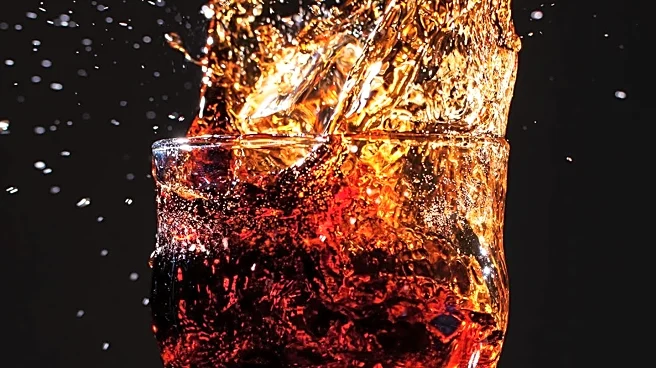What's Happening?
A new beverage trend known as 'heavy soda' is gaining attention online, characterized by an increased syrup content for maximum sweetness. This trend has been observed at gas stations in southern Missouri, where machines are labeled 'heavy' for popular sodas like Pepsi, Mountain Dew, and Dr Pepper. The concept is designed to maintain flavor even as ice melts, similar to the syrup ratios used by McDonald's for their Coke. While some people are intrigued by the idea, others express concern over the excessive sweetness. The trend is part of a broader category of 'stunt food,' which includes over-the-top culinary creations. Despite its novelty, the trend raises health concerns due to the high sugar content, which can lead to cavities, gum inflammation, and enamel erosion.
Why It's Important?
The heavy soda trend highlights ongoing debates about dietary choices and health implications. The increased syrup content poses potential health risks, including dental issues and broader health concerns linked to excessive sugar consumption. This trend reflects a cultural shift towards indulgent food experiences, despite growing awareness of healthy eating. The popularity of such trends can influence consumer behavior and impact public health, particularly in regions where these beverages are readily available. As the trend gains traction, it may prompt discussions among health professionals and policymakers about regulating sugar content in beverages to mitigate health risks.
What's Next?
If the heavy soda trend continues to grow, it may lead to increased scrutiny from health organizations and calls for regulatory measures to address sugar content in beverages. Public health campaigns could emerge to educate consumers about the risks associated with high sugar intake. Additionally, beverage companies might explore alternative formulations to balance flavor with health considerations. The trend could also inspire similar innovations in the food and beverage industry, potentially leading to new products that cater to consumer demand for unique and indulgent experiences.
Beyond the Headlines
The heavy soda trend underscores a cultural fascination with 'stunt food,' where shock value and flavor are prioritized over health. This phenomenon reflects broader societal attitudes towards food consumption, where indulgence often trumps nutritional value. The trend may also influence marketing strategies, as companies capitalize on consumer interest in novel and extreme food experiences. Long-term, this could contribute to shifts in dietary habits and perceptions of what constitutes a treat, challenging traditional notions of moderation and health.









